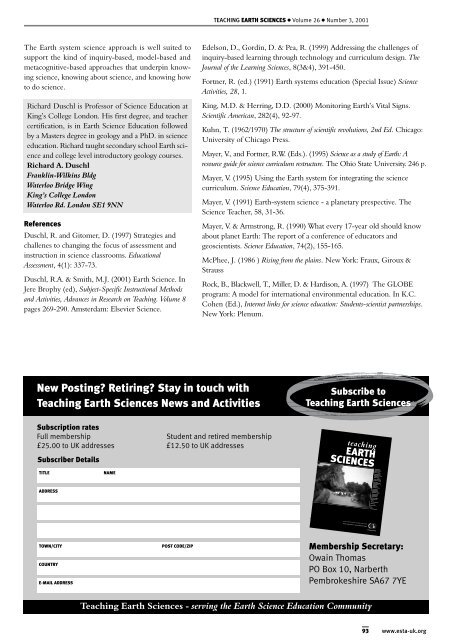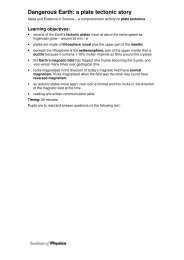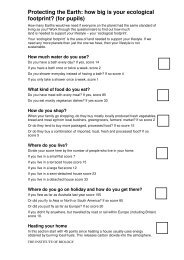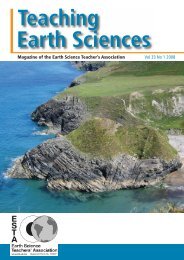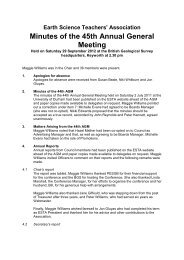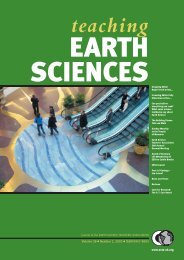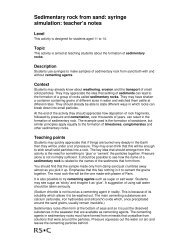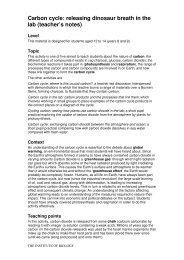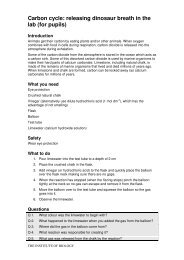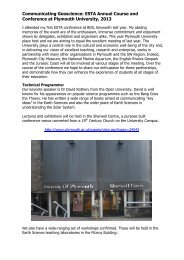teaching - Earth Science Teachers' Association
teaching - Earth Science Teachers' Association
teaching - Earth Science Teachers' Association
Create successful ePaper yourself
Turn your PDF publications into a flip-book with our unique Google optimized e-Paper software.
Journal of EARTH SCIENCE TEACHERS ASSOCIATION<br />
Volume 26 ● Number 3, 2001 ● ISSN 0957-8005<br />
rth <strong>Science</strong><br />
ach<br />
Iron Ore Formation:<br />
A Laboratory Model<br />
Developing<br />
Observational Ski ls<br />
for Geoscience<br />
Fieldwork:<br />
Stage 3 Pupils<br />
Further Thoughts –<br />
Where Next for<br />
ESTA?<br />
New ESTA Members<br />
Websearch<br />
Book Reviews<br />
Diary<br />
Cash for Research<br />
TEACHING EARTH SCIENCES ● Volume 26 ● Number 3, 2001<br />
The <strong>Earth</strong> system science approach is well suited to<br />
support the kind of inquiry-based, model-based and<br />
metacognitive-based approaches that underpin knowing<br />
science, knowing about science, and knowing how<br />
to do science.<br />
Richard Duschl is Professor of <strong>Science</strong> Education at<br />
King’s College London. His first degree, and teacher<br />
certification, is in <strong>Earth</strong> <strong>Science</strong> Education followed<br />
by a Masters degree in geology and a PhD. in science<br />
education. Richard taught secondary school <strong>Earth</strong> science<br />
and college level introductory geology courses.<br />
Richard A. Duschl<br />
Franklin-Wilkins Bldg<br />
Waterloo Bridge Wing<br />
King’s College London<br />
Waterloo Rd. London SE1 9NN<br />
References<br />
Duschl, R. and Gitomer, D. (1997) Strategies and<br />
challenes to changing the focus of assessment and<br />
instruction in science classrooms. Educational<br />
Assessment, 4(1): 337-73.<br />
Duschl, R.A. & Smith, M.J. (2001) <strong>Earth</strong> <strong>Science</strong>. In<br />
Jere Brophy (ed), Subject-Specific Instructional Methods<br />
and Activities, Advances in Research on Teaching. Volume 8<br />
pages 269-290. Amsterdam: Elsevier <strong>Science</strong>.<br />
Edelson, D., Gordin, D. & Pea, R. (1999) Addressing the challenges of<br />
inquiry-based learning through technology and curriculum design. The<br />
Journal of the Learning <strong>Science</strong>s, 8(3&4), 391-450.<br />
Fortner, R. (ed.) (1991) <strong>Earth</strong> systems education (Special Issue) <strong>Science</strong><br />
Activities, 28, 1.<br />
King, M.D. & Herring, D.D. (2000) Monitoring <strong>Earth</strong>’s Vital Signs.<br />
Scientific American, 282(4), 92-97.<br />
Kuhn, T. (1962/1970) The structure of scientific revolutions, 2nd Ed. Chicago:<br />
University of Chicago Press.<br />
Mayer, V., and Fortner, R.W. (Eds.). (1995) <strong>Science</strong> as a study of <strong>Earth</strong>: A<br />
resource guide for science curriculum restructure. The Ohio State University. 246 p.<br />
Mayer, V. (1995) Using the <strong>Earth</strong> system for integrating the science<br />
curriculum. <strong>Science</strong> Education, 79(4), 375-391.<br />
Mayer, V. (1991) <strong>Earth</strong>-system science - a planetary prespective. The<br />
<strong>Science</strong> Teacher, 58, 31-36.<br />
Mayer, V. & Armstrong, R. (1990) What every 17-year old should know<br />
about planet <strong>Earth</strong>: The report of a conference of educators and<br />
geoscientists. <strong>Science</strong> Education, 74(2), 155-165.<br />
McPhee, J. (1986 ) Rising from the plains. New York: Fraux, Giroux &<br />
Strauss<br />
Rock, B., Blackwell, T., Miller, D. & Hardison, A. (1997) The GLOBE<br />
program: A model for international environmental education. In K.C.<br />
Cohen (Ed.), Internet links for science education: Students-scientist partnerships.<br />
New York: Plenum.<br />
New Posting? Retiring? Stay in touch with<br />
Teaching <strong>Earth</strong> <strong>Science</strong>s News and Activities<br />
Subscribe to<br />
Teaching <strong>Earth</strong> <strong>Science</strong>s<br />
Subscription rates<br />
Full membership<br />
Student and retired membership<br />
£25.00 to UK addresses £12.50 to UK addresses<br />
Subscriber Details<br />
<strong>teaching</strong><br />
EARTH<br />
SCIENCES<br />
TITLE<br />
NAME<br />
<strong>Earth</strong> System<br />
<strong>Science</strong>: A Be ter<br />
Way to Teach<br />
<strong>Science</strong> Enquiry<br />
Geology and the<br />
Human Environment<br />
– The Nuclear<br />
Waste Problem<br />
ADDRESS<br />
a Web-based<br />
Teaching Exercise<br />
<strong>Earth</strong> <strong>Science</strong><br />
Activities and<br />
Demonstrations:<br />
Sedimentary Rocks<br />
An <strong>Earth</strong> <strong>Science</strong><br />
Fieldtrip for Key<br />
www.esta-uk.org<br />
TOWN/CITY<br />
COUNTRY<br />
E-MAIL ADDRESS<br />
POST CODE/ZIP<br />
Membership Secretary:<br />
Owain Thomas<br />
PO Box 10, Narberth<br />
Pembrokeshire SA67 7YE<br />
Teaching <strong>Earth</strong> <strong>Science</strong>s - serving the <strong>Earth</strong> <strong>Science</strong> Education Community<br />
93 www.esta-uk.org


